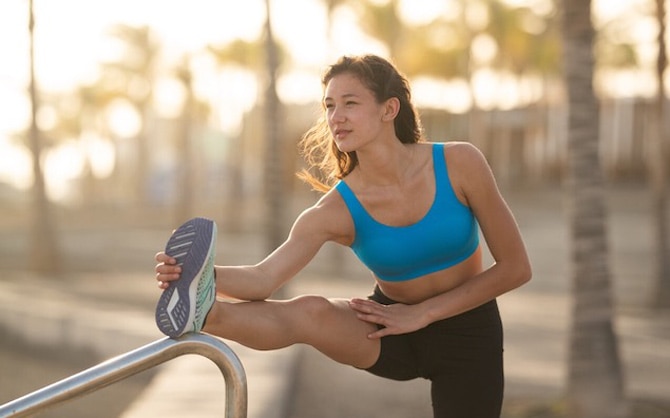5 of the best hamstring exercises for runners

Your hamstrings are an important muscle group if you like to run (or even just walk). Not taking care of them can lead to some serious recovery time. While there are a variety of ways to develop a hamstring injury while running, being proactive about strengthening and stretching these muscles with hamstring exercises can go a long way toward preventing any hamstring pain when running or other issues.
What do hamstrings do, anyway?
The hamstrings are a group of three muscles on the back of your thighs. When you run, your hamstrings play a crucial role in stabilising your knees and lower legs and helping your body push off the ground with each step.
Working your hamstrings isn't as straight forward as you might think. Many runners are quad-dominant, meaning the muscles in the front of the thigh overpower the hamstrings. A sore leg often means all of your muscles weren't equally fired up during your workout. There are hamstring stretches for runners that you can do to fix this problem.
5 key stretches for healthy hamstrings
While getting a good hamstring workout isn't tough, it takes intention. Here are five of the best hamstring exercises to help keep these muscles strong and healthy.
- Piriformis stretch. This stretch can get intense fast, so take it slowly. Lie on your back with your knees bent. Bring one knee into your chest, then rest your ankle on your quad. Pull at your planted hamstring, and if you can tolerate it without pain, pull until your planted foot is off the ground.
- Clamshells. This exercise for hamstrings is great for the the upper hamstring, which is attached to the glutes. Strengthening your hips can prevent lower leg injuries since insufficient hip stabilisation is often a culprit. Lie on your side with your knees bent and stacked on top of each other. Rest your head on your outstretched lower arm. With your feet touching, raise your top knee. The rest of your body should be stable while you do this, and you should feel the stretch in your glutes. Consider using a resistance band to complete this exercise.

- Glute bridges. Start by lying on your back with your knees bent and feet planted. Slowly bring your hips to the sky as far as you can, but don't lift your upper back and chest off of the floor. For added stabilisation, consider placing your feet on an exercise ball instead of the floor. Take this a step further by straightening one leg and keeping it raised.
- Donkey kicks. Start on all fours, with your shoulders over your wrists, hip-distance apart. Raise one leg in the air, bent at the same 90-degree angle. For more of a challenge, consider placing a dumbbell behind your knee or wearing a resistance band around your knees.
- Deadlifts. There are quite a few variations, but if done right, this is one of the best hamstring exercises. If you'd like to try with a barbell, start with your feet hip-width apart, knees slightly bent. Bend forward to pick up your bar, making sure your hips are sitting back. Then, pick up your bar with your knuckles facing you. Lift with the muscles in your hips, not your back (ouch!). This is achieved by strongly gripping the bar but letting your arms hang.
If you're trying hamstring exercises because you're already experiencing pain or discomfort in your thighs, it may be best to pay a visit to your doctor or physical therapist to rule out any injuries. There are always things that can be done to help prevent injuries as well so keep this in mind so you can run safely in future.
If we have inspired you to think more about hamstring exercises and how to best protect yourself from hamstring injuries, check out Brooks' range of stability running shoes to get the support you need from your shoes.
Our writer's advice is intended for informational or general educational purposes only. We always encourage you to speak to your doctor or healthcare provider before making any adjustments to your running, nutrition or fitness routines.

